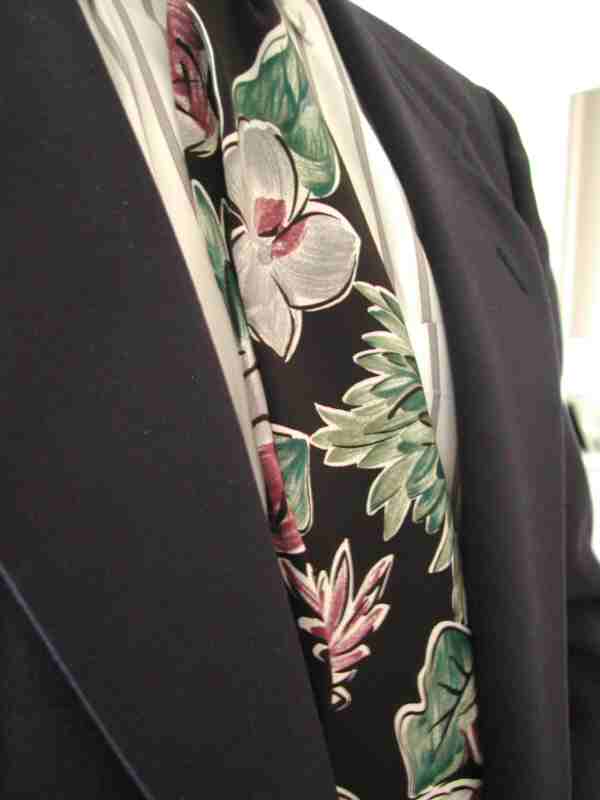December 28, 2007
Friday I donned a coat and tie for a wedding, then arrived at church to find it was scheduled for Saturday. So I went grocery shopping instead.
 Whereupon I was reminded that strangers treat you better when you're well-dressed. The cashier, smiling and more courteous than usual, complimented me on my necktie. I thanked her and then, perhaps unnecessarily, noted that I'd bought my last one in 1992. (That was the year my company stopped prescribing business attire.)
Whereupon I was reminded that strangers treat you better when you're well-dressed. The cashier, smiling and more courteous than usual, complimented me on my necktie. I thanked her and then, perhaps unnecessarily, noted that I'd bought my last one in 1992. (That was the year my company stopped prescribing business attire.)
Several years prior to that, after graduating from college and adopting the office dress-up ritual, I learned quickly that my weekday appearance mattered to just a few people, namely my boss and his colleagues. I took their sparing comments to heart because, frankly, I had little idea how to build a wardrobe. Dad had always worn suits to his office; he once told me of the wary looks directed at him when, early in his career, he showed up for a company event wearing a sportcoat, while everyone else was in a suit.
But I also came of age in the 1970s, when leisure suits, three-prong belts, and cartoonish lapels and collars warped the social fabric of fashion. The 1980s saw a return to tradition, but I didn't trust it enough to buy in. Besides, I thought skinny ties were fun.
at my third post-college job i would answer to a female boss. By then I'd tamed my enthusiasm for baggy pants, etc., and she always took note when I'd invested in a well-cut, quality suit or new pair of shoes. My male bosses never did that. They might have offered some backhanded correction ("Are those trousers really your size?"), but they never went out of their way to offer compliments. It usually takes a female—and one who has no interest in you as a mate—to do that.
Our office building had a common area where retail vendors would set up shop each day to sell to employees. One morning I was looking over some neckties when my boss happened by. She singled out several of a style I had overlooked, holding them up to my collar before approving or setting them aside.
Right then it dawned on me that I should let her choose whatever I could afford. I realized that once I'd knotted a necktie and left my house, I never saw it the rest of the day, but she'd notice it every time I came in sight.
Had I been able to take her clothes-shopping with me after hours, I'd have done so. My opinion of what looked good on me didn't matter; it was, and would always be, up to the approval of her and others.
frankly, i've never had room in my head for thinking about how I'm dressed. I've heard about how some people are winters, others autumns, and that the colors we choose should key on our eyes, skin tones, and hair. Whatever. My only concern is whether I'm within my budget, and that my clothes look new and smell clean.
For me, it was enough to remember, when leaning over a typewriter (later, a printer), to place one hand over my necktie so it wouldn't get mangled; to hitch my trousers before sitting, so as to preserve their crease; and to shape my dress shoes with cedar trees. These habits I learned from Dad. Although his fashion sense was from another era, his manners are eternal.
In his time, the unwritten rules were simpler. You couldn't go wrong by just wearing the same things as everyone else.
In the age of dress-casual, you can no longer do that. Each department and echelon has its own set of unwritten rules. Managers who want a promotion always wear collared shirts and slacks. Their subordinates puzzle over whether they can wear jerseys and sweatshirts given to them by the company. The secretaries aren't afraid to look feminine, as many of them are single and the office is where many meet their mates. And the ever-important tech types show up in flip-flops and ironic T-shirts, to the consternation of company officers who okayed "office casual" 15 years ago when everyone knew that meant you didn't show up ready to play beach volleyball.
Helpful criticism has gotten even more sparse in the politically charged office. A heterosexual male cannot say he likes a female's choice in clothing, and he certainly isn't going to take her down a notch, either. The guys only comment on each other's dress when it pushes a boundary (see the above with regard trouser sizes).
In any event, I still look to my boss (and now, my wife) for approval of what I wear. It's just one less thing to think about as my world grows more complex and demanding.
Posted by: Michael Rittenhouse at
10:21 AM
| No Comments
| Add Comment
Post contains 822 words, total size 5 kb.
21 queries taking 0.0099 seconds, 16 records returned.
Powered by Minx 1.1.6c-pink.
